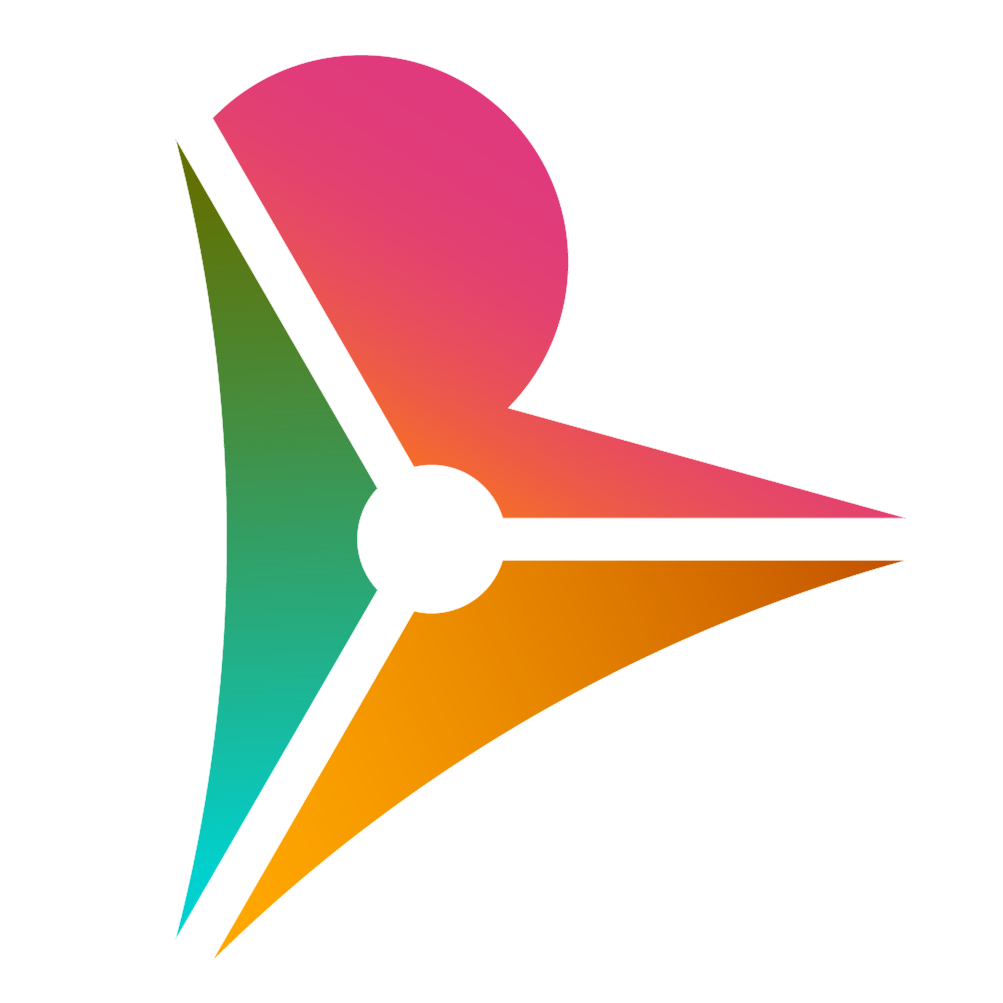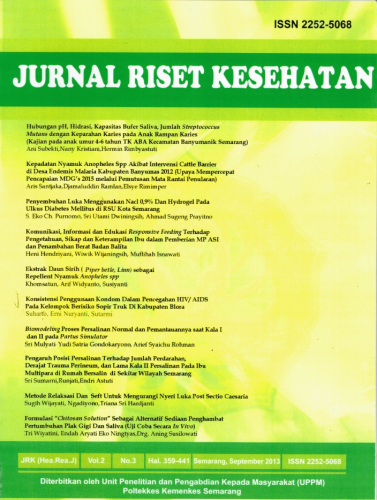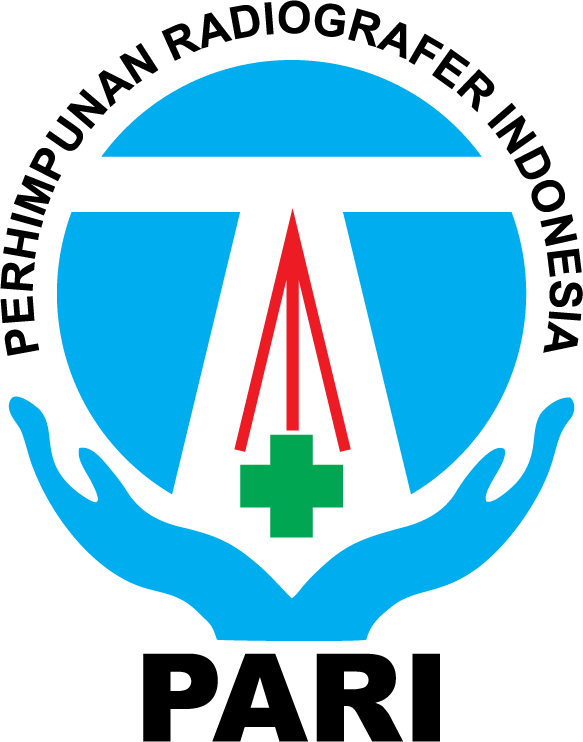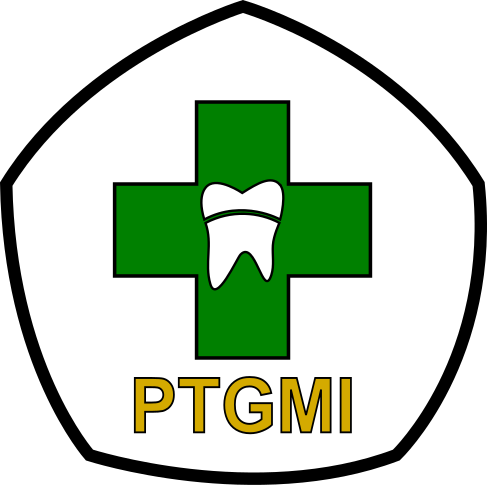- Focus and Scope
- Section Policies
- Peer Review Process
- Publication Frequency
- Open Access Policy
- Publication Ethics
- Content Licence
- Indexing
Focus and Scope
Jurnal Riset Kesehatan (ISSN: 2252-5068) is a peer-reviewed journal that publishes scientific articles about health sciences. The articles were published on the results of original scientific research (top priority), scientific review article that is new (not a priority), or commentary or criticism of the article in the Jurnal Riset Kesehatan.
- Nursing (fundamentals of nursing, management in nursing, medical-surgical nursing, critical care nursing, emergency, and trauma nursing, oncology nursing, community health nursing, occupational health nursing, mental health nursing, holistic nursing, geriatric nursing, family nursing, maternity nursing, woman’s health nursing, pediatric nursing, education in nursing, advanced practice nursing).
- Midwifery (reproductive health, family planning, health education and counseling, maternal and infant care, midwifery in complementary).
- Nutrition (clinical nutrition, community nutrition, sports nutrition, food service management, nutrition biochemistry, food science, food safety, nutrition in disaster emergency, and other area related to nutrition).
- Medical Record and Health Information (management of medical records and health information, classification and codification of diseases related to health problems and procedure, quality management of health information, health statistics, management of health care financing systems, development of information technology in the field of medical records).
- Radiology (conventional radiography, digital radiography, ct-scan, magnetic resonance imaging, nuclear medicine, ultrasonography, quality management in radiology, radiation safety, radiation theraphy).
- Medical Laboratory Technology (bacteriology, microbiology, virology, hematology, parasitology, immunoserology, clinical chemistry, toxicology, food and beverage analysis, and any sciences related to medical laboratory area).
- Dental Health (oral maxillofacial surgery, pediatric dentistry, prosthodontic, dental forensic, periodontic, oral medicine, oral radiology, oral biology, orthodontic, dental material, operative dentistry, endodontic, biomoleculer dentistry, oral pathology.
- Public Health (health epidemiology, disease prevention, biostatistic health, health administration and management, public health nutrition, environmental health, safety and occupational health, health promotion, reproductive health, maternal and child health, and other article related in improving the health of entire populations.
Section Policies
Articles
Peer Review Process
Articles submitted to Jurnal Riset Kesehatan (e-ISSN: 2461-1026) will be evaluated through 2 stages of review, pre-review and substance review.
The pre-review of the article is done by the editorial team to review the conformity of the article with the focus and scope of the journal as well as the journal style and specific Jurnal Riset Kesehatan writing guidelines.
Substantial single-blind reviews are performed by at least 2 reviewers. Duration of review between 3-12 weeks. If desired, the reviewer may request a re-review after the author revises his/her article.
- In the process of Scientific Journal Issuance is carried out through several stages, namely:
- Collection of papers
- Paper evaluation process by the designated reviewer
- Paper revision process
- Editing papers that have been declared Accepted
- Delivery of the results of editing the paper to the author for proofreading
- Assignment of Copyright Request from the author
- Publishing scientific journals
In detail, the process is as follows:
- Enter data paper into the database
- Print a disposition sheet
- Make a paper archive
- Determine the Reviewer paper
- Send paper to the referee for evaluation.
- Send notification to the author.
- Sending report referee to the author for revision.
- Request further comments from the reviewer on the revised paper.
- If the paper still has to be revised, further comments are sent to the author.
- Editing the paper in accordance with the Proceedings format.
- Submitting the paper to the author for final reading.
- Do the final editing.
- Publish a journal.
Review Guidelines

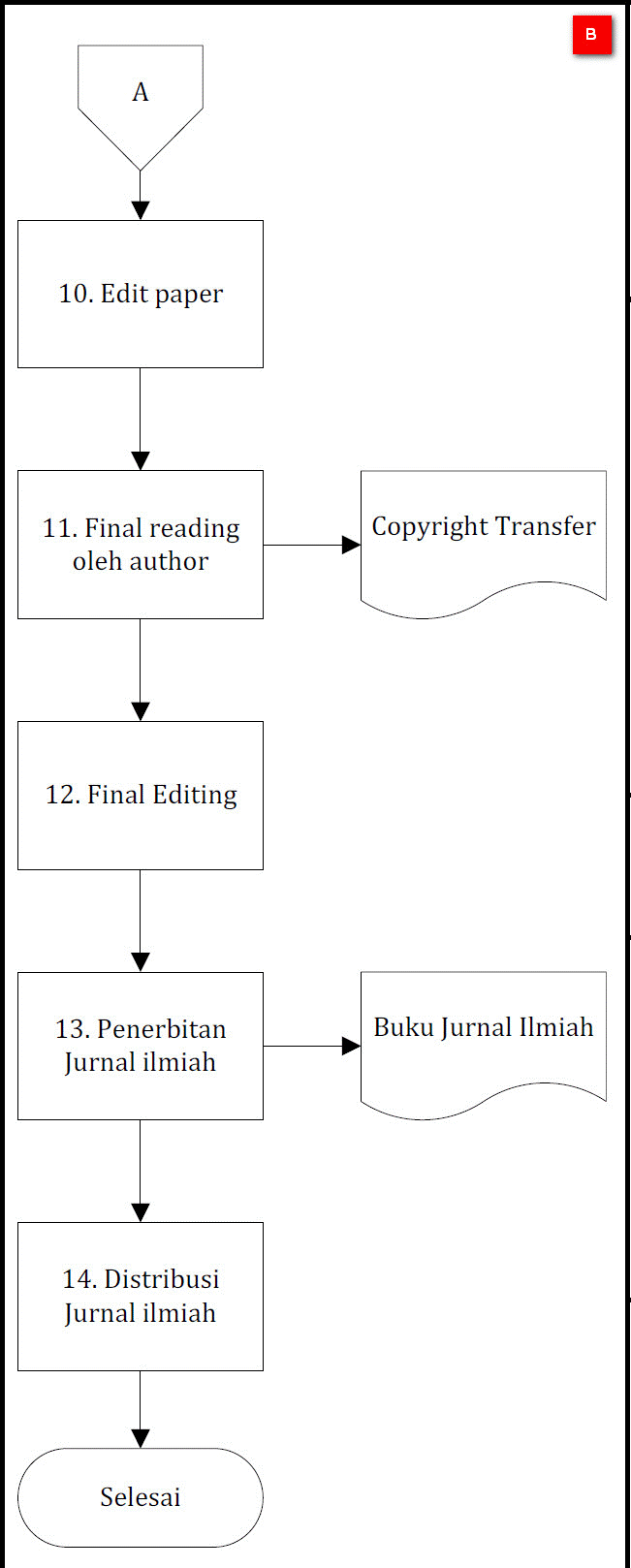
Publication Frequency
Jurnal Riset Kesehatan terbit setahun 2 kali, pada bulan Mei dan November.
The Jurnal Riset Kesehatan is published every six months, in May and November each year.
Open Access Policy
Jurnal ini menyediakan akses terbuka langsung ke konten pada prinsip bahwa melakukan penelitian tersedia secara bebas untuk umum mendukung pertukaran global yang lebih besar pengetahuan.
This journal provides open access to content in essence which can be used for globalization.
Biaya Proses Artikel
Jurnal Riset Kesehatan (e-ISSN: 2461-1026) adalah jurnal akses terbuka. Pengajuan penulis, serta pemrosesan artikel dan penerbitan, biaya Rp 500.000,00. Pembayaran dapat dilakukan melalui metode transfer ke Bank BNI dengan Nomor Rekening 2998877334 a.n RPL 134 BLU Poltekkes Semarang Untuk Dana Kelolaan. Pembaca dapat membaca dan mengunduh artikel teks lengkap secara gratis.
Article Processing Charge
Jurnal Riset Kesehatan (e-ISSN: 2461-1026) is an open access journal. Author submission, as well as article processing and publishing, is Rp 500.000,00. Payment can be made via transfer method to BNI Bank with Account Number 2998877334 in the name of RPL 134 BLU Poltekkes Semarang Untuk Dana Kelolaan. Readers can read and download any full-text articles for free of charge.
Publication Ethics
Publication Ethics and Malpractice Statement
Jurnal Riset Kesehatan (e-ISSN: 2461-1026) Adalah jurnal peer-reviewed yang diterbitkan oleh Pusat Penelitian dan Pengabdian kepada Masyarakat, Poltekkes Kemenkes Semarang. Pernyataan ini menjelaskan perilaku etis dari semua pihak yang terlibat dalam penerbitan artikel di jurnal ini, termasuk penulis, pemimpin redaksi, Dewan Editorial, Peer-reviewer dan penerbit. Pernyataan ini didasarkan pada COPE’s Best Practice Guidelines for Journal Editors.
*Jurnal Riset Kesehatan (e-ISSN: 2461-1026) is a peer-reviewed journal published by Pusat Penelitian dan Pengabdian kepada Masyarakat, Poltekkes Kemenkes Semarang. This statement clarifies the ethical behaviour of all parties involved in the act of publishing an article in this journal, including the author, the chief editor, the Editorial Board, the peer-reviewer and the publisher. This statement is based on COPE’s Best Practice Guidelines for Journal Editors.
Panduan Etik untuk Publikasi Jurnal
Artikel dalam Jurnal Riset Kesehatan yang dikaji oleh reviewer merupakan bagian penting dalam pengembangan pengetahuan yang koheren dan dihormati. Ini merupakan cerminan langsung dari kualitas kerja para penulis dan lembaga-lembaga yang mendukung mereka. Artikel-artikel yang ditinjau ulang mendukung dan mewujudkan metode ilmiah yang baik. Oleh karena itu penting untuk menyetujui standar perilaku etika yang diharapkan untuk semua pihak yang terlibat dalam tindakan penerbitan baik penulis, editor jurnal, peer reviewer, penerbit dan masyarakat. UPPM Poltekkes Kemenkes Semarang sebagai penerbit Jurnal Riset Kesehatan menjalankan tugasnya sebagai perwalian atas semua tahap penerbitan dengan sangat serius dan kami mengakui tanggung jawab etis dan tanggung jawab kami lainnya. Kami berkomitmen untuk memastikan bahwa iklan, cetak ulang, atau pendapatan komersial lainnya tidak memiliki dampak atau pengaruh terhadap keputusan editorial. Selain itu, Pusat Penelitian dan Pengabdian kepada Masyarakat, Poltekkes Kemenkes Semarang dan Dewan Redaksi akan membantu dalam komunikasi dengan jurnal dan / atau penerbit lain di mana hal ini berguna dan perlu.
*The publication of an article in a peer-reviewed JRK journal is an essential building block in the development of a coherent and respected network of knowledge. It is a direct reflection of the quality of the work of the authors and the institutions that support them. Peer-reviewed articles support and embody the scientific method. It is therefore important to agree upon standards of expected ethical behaviour for all parties involved in the act of publishing: the author, the journal editor, the peer reviewer, the publisher and the society. Pusat Penelitian dan Pengabdian kepada Masyarakat, Poltekkes Kemenkes Semarang as publisher of JRK journal takes its duties of guardianship over all stages of publishing extremely seriously and we recognize our ethical and other responsibilities. We are committed to ensuring that advertising, reprint or other commercial revenue has no impact or influence on editorial decisions. In addition, the UPPM Poltekkes Kemenkes Semarang and Editorial Board will assist in communications with other journals and/or publishers where this is useful and necessary.
Keputusan publikasi
Editor Jurnal JRK bertanggung jawab untuk memutuskan artikel mana yang diserahkan ke jurnal yang harus diterbitkan. Validasi karya yang dipertanyakan dan kepentingannya bagi para peneliti dan pembaca harus selalu mendorong keputusan semacam itu. Para editor dapat dipandu oleh kebijakan dari dewan redaksi jurnal dan dibatasi oleh persyaratan hukum seperti yang berlaku saat ini terkait dengan pencemaran nama baik, pelanggaran hak cipta dan plagiarisme. Para editor dapat berunding dengan editor atau reviewer lain dalam membuat keputusan ini.
*The editor of the JRK journal is responsible for deciding which of the articles submitted to the journal should be published. The validation of the work in question and its importance to researchers and readers must always drive such decisions. The editors may be guided by the policies of the journal's editorial board and constrained by such legal requirements as shall then be in force regarding libel, copyright infringement and plagiarism. The editors may confer with other editors or reviewers in making this decision.
Fair Play
Seorang editor setiap saat mengevaluasi naskah untuk konten intelektualnya tanpa memperhatikan ras, jenis kelamin, orientasi seksual, keyakinan agama, asal etnis, kewarganegaraan, atau filsafat politik penulisnya.
*An editor at any time evaluates manuscripts for their intellectual content without regard to race, gender, sexual orientation, religious belief, ethnic origin, citizenship, or political philosophy of the authors.
Kerahasiaan
Editor dan staf editorial apa pun tidak boleh mengungkapkan informasi apapun tentang naskah yang dikirimkan kepada siapapun selain dari penulis, peninjau, peninjau potensial, penasihat editorial lainnya, dan penerbit yang sesuai, sebagaimana mestinya.
*The editor and any editorial staff must not disclose any information about a submitted manuscript to anyone other than the corresponding author, reviewers, potential reviewers, other editorial advisers, and the publisher, as appropriate.
Pengungkapan dan konflik kepentingan
Materi yang tidak dipublikasikan yang diungkapkan dalam manuskrip yang disampaikan tidak boleh digunakan dalam penelitian editor sendiri tanpa persetujuan tertulis dari penulis.
*Unpublished materials disclosed in a submitted manuscript must not be used in an editor's own research without the express written consent of the author.
Kewajiban Reviewer
Kontribusi untuk Keputusan Editorial Ulasan
Reviewer membantu editor dalam membuat keputusan editorial dan melalui komunikasi editorial dengan penulis juga dapat membantu penulis dalam meningkatkan naskah.
Promptness
Setiap ditunjuk sebagai reviewer yang merasa tidak memenuhi syarat untuk meninjau penelitian yang dilaporkan dalam naskah atau mengetahui bahwa tinjauan cepatnya tidak mungkin, harus memberitahu editor dan menarik dirinya sendiri dari proses peninjauan.
Kerahasiaan
Setiap manuskrip yang diterima untuk ditinjau harus diperlakukan sebagai dokumen rahasia. Mereka tidak boleh ditunjukkan atau didiskusikan dengan orang lain kecuali sebagaimana diizinkan oleh editor.
Standar Objektivitas
Ulasan harus dilakukan secara objektif. Kritikan pribadi untuk penulis tidak diperbolehkan. Reviewer harus mengungkapkan pandangan mereka dengan jelas dengan argumen pendukung.
Pengakuan Sumber
Peninjau harus mengidentifikasi karya yang diterbitkan yang relevan yang belum dikutip oleh penulis. Setiap pernyataan bahwa observasi, derivasi, atau argumen telah dilaporkan sebelumnya harus disertai dengan kutipan yang relevan. Peninjau juga harus meminta perhatian editor jika ada kemiripan substansial atau tumpang tindih antara naskah yang sedang dipertimbangkan dan naskah lain yang diterbitkan yang memiliki pengetahuan pribadi.
Pengungkapan dan Benturan Kepentingan
Informasi atau gagasan istimewa yang diperoleh melalui peninjauan harus dijaga kerahasiaannya dan tidak digunakan untuk keuntungan pribadi. Reviewer tidak boleh mempertimbangkan manuskrip di mana mereka memiliki konflik kepentingan yang dihasilkan dari persaingan, kolaboratif, atau hubungan atau hubungan lain dengan salah satu penulis, perusahaan, atau lembaga yang terhubung ke kertas.
*Duties of Reviewers
Contribution to Editorial Decisions
Peer review assists the editor in making editorial decisions and through the editorial communications with the author may also assist the author in improving the paper.
Promptness
Any selected referee who feels unqualified to review the research reported in a manuscript or knows that its prompt review will be impossible should notify the editor and excuse himself from the review process.
Confidentiality
Any manuscripts received for review must be treated as confidential documents. They must not be shown to or discussed with others except as authorized by the editor.
Standards of Objectivity
Reviews should be conducted objectively. Personal criticism of the author is inappropriate. Referees should express their views clearly with supporting arguments.
Acknowledgement of Sources
Reviewers should identify relevant published work that has not been cited by the authors. Any statement that an observation, derivation, or argument had been previously reported should be accompanied by the relevant citation. A reviewer should also call to the editor's attention any substantial similarity or overlap between the manuscript under consideration and any other published paper of which they have personal knowledge.
Disclosure and Conflict of Interest
Privileged information or ideas obtained through peer review must be kept confidential and not used for personal advantage. Reviewers should not consider manuscripts in which they have conflicts of interest resulting from competitive, collaborative, or other relationships or connections with any of the authors, companies, or institutions connected to the papers.
Tugas Penulis
Standar Pelaporan
Penulis laporan penelitian asli harus menyajikan laporan akurat tentang pekerjaan yang dilakukan, Serta diskusi obyektif dari signifikansinya. Data yang mendasari harus diwakili secara akurat di naskah publikasinya. Sebuah naskah harus memuat detail dan referensi yang cukup untuk memungkinkan orang lain mereplikasi pekerjaan. Pernyataan yang curang atau dengan sengaja tidak akurat merupakan perilaku yang tidak etis dan tidak dapat diterima.
Akses dan Retensi Data
Penulis diminta untuk menyediakan data mentah sehubungan dengan naskah untuk tinjauan editorial, dan harus siap untuk menyediakan akses publik ke data tersebut (konsisten dengan Pernyataan ALPSP-STM tentang Data dan Basis Data), jika memungkinkan, dan dalam hal apa pun harus siap untuk mempertahankan data tersebut untuk waktu yang wajar setelah publikasi.
Orisinalitas dan Plagiarisme
Para penulis harus memastikan bahwa mereka telah menulis karya yang sepenuhnya asli, dan jika penulis telah menggunakan karya dan / atau kata-kata orang lain yang telah dikutip atau dikutip dengan tepat.
Publikasi Ganda, Redundan atau Bersamaan.
Seorang penulis tidak boleh, secara umum, mempublikasikan naskah yang menjelaskan pada dasarnya penelitian yang sama di lebih dari satu jurnal atau publikasi utama. Mengirimkan naskah yang sama ke lebih dari satu jurnal secara bersamaan merupakan perilaku penerbitan yang tidak etis dan tidak dapat diterima.
Pengakuan atas Sumber
Pengakuan yang tepat atas karya orang lain harus selalu diberikan. Penulis harus mengutip publikasi yang telah berpengaruh dalam menentukan sifat pekerjaan yang dilaporkan.
Karangan Penguasaan Naskah
Pembatasan bagi mereka yang telah memberikan kontribusi signifikan pada konsepsi, desain, pelaksanaan, atau interpretasi dari penelitian yang dilaporkan. Semua orang yang telah membuat kontribusi signifikan harus terdaftar sebagai rekan penulis. Di mana ada orang lain yang telah berpartisipasi dalam aspek substantif tertentu dari proyek penelitian, mereka harus diakui atau terdaftar sebagai kontributor. Penulis harus memastikan bahwa semua rekan penulis yang tepat dan tidak ada rekan penulis yang tidak pantas dimasukkan dalam naskah dan bahwa semua penulis bersama telah melihat dan menyetujui versi akhir naskah ini dan telah menyetujui pengajuannya untuk publikasi.
Bahaya dan Subjek Manusia atau Hewan
Jika pekerjaan melibatkan bahan kimia, prosedur atau peralatan yang memiliki bahaya tidak biasa yang melekat dalam penggunaannya, penulis harus secara jelas mengidentifikasi ini di dalam naskah.
Pengungkapan dan Pertentangan Kepentingan
Semua penulis harus mengungkapkan dalam naskah mereka setiap konflik keuangan atau konflik substantif lainnya yang mungkin ditafsirkan untuk mempengaruhi hasil atau interpretasi naskah mereka. Semua sumber dukungan keuangan untuk proyek harus diungkapkan.
Kesalahan mendasar dalam karya yang diterbitkan
Ketika seorang penulis menemukan kesalahan atau ketidaktepatan yang signifikan dalam karyanya yang diterbitkan, adalah kewajiban penulis untuk segera memberi tahu editor jurnal atau penerbit dan bekerja sama dengan editor untuk menarik kembali atau memperbaiki kertas.
*Duties of Authors
Reporting standards
Authors of reports of original research should present an accurate account of the work performed as well as an objective discussion of its significance. Underlying data should be represented accurately in the paper. A paper should contain sufficient detail and references to permit others to replicate the work. Fraudulent or knowingly inaccurate statements constitute unethical behaviour and are unacceptable.
Data Access and Retention
Authors are asked to provide the raw data in connection with a paper for editorial review, and should be prepared to provide public access to such data (consistent with the ALPSP-STM Statement on Data and Databases), if practicable, and should in any event be prepared to retain such data for a reasonable time after publication.
Originality and Plagiarism
The authors should ensure that they have written entirely original works, and if the authors have used the work and/or words of others that this has been appropriately cited or quoted.
Multiple, Redundant or Concurrent Publication
An author should not, in general, publish manuscripts describing essentially the same research in more than one journal or primary publication. Submitting the same manuscript to more than one journal concurrently constitutes unethical publishing behaviour and is unacceptable.
Acknowledgement of Sources
Proper acknowledgement of the work of others must always be given. Authors should cite publications that have been influential in determining the nature of the reported work.
Authorship of the Paper
Authorship should be limited to those who have made a significant contribution to the conception, design, execution, or interpretation of the reported study. All those who have made significant contributions should be listed as co-authors. Where there are others who have participated in certain substantive aspects of the research project, they should be acknowledged or listed as contributors. The corresponding author should ensure that all appropriate co-authors and no inappropriate co-authors are included on the paper and that all co-authors have seen and approved the final version of the paper and have agreed to its submission for publication.
Hazards and Human or Animal Subjects
If the work involves chemicals, procedures or equipment that have any unusual hazards inherent in their use, the author must clearly identify these in the manuscript.
Disclosure and Conflicts of Interest
All authors should disclose in their manuscript any financial or other substantive conflicts of interest that might be construed to influence the results or interpretation of their manuscript. All sources of financial support for the project should be disclosed.
Fundamental errors in published works
When an author discovers a significant error or inaccuracy in his/her own published work, it is the author’s obligation to promptly notify the journal editor or publisher and cooperate with the editor to retract or correct the paper.
Content Licence
 Creative Common Attribution-ShareAlike 4.0 International (CC BY-SA 4.0)
Creative Common Attribution-ShareAlike 4.0 International (CC BY-SA 4.0)
Anda diperbolehkan:
- Berbagi - menyalin dan menyebarluaskan kembali materi ini dalam bentuk atau format apapun;
- Adaptasi - menggubah, mengubah, dan membuat turunan dari materi ini untuk kepentingan apapun, termasuk kepentingan komersial. Lisensi ini diterima untuk Ciptaan Budaya Bebas.
Pemberi lisensi tidak dapat mencabut ketentuan di atas sepanjang Anda mematuhi ketentuan lisensi ini.
Berdasarkan ketentuan berikut:
- Atribusi — Anda harus mencantumkan nama yang sesuai, mencantumkan tautan terhadap lisensi, dan menyatakan bahwa telah ada perubahan yang dilakukan. Anda dapat melakukan hal ini dengan cara yang sesuai, namun tidak mengisyaratkan bahwa pemberi lisensi mendukung Anda atau penggunaan Anda.
- Berbagi Serupa — Apabila Anda menggubah, mengubah, atau membuat turunan dari materi ini, Anda harus menyebarluaskan kontribusi Anda di bawah lisensi yang sama dengan materi asli.
- Tidak ada pembatasan tambahan — Anda tidak dapat menggunakan ketentuan hukum atau sarana kontrol teknologi yang secara hukum membatasi orang lain untuk melakukan hal-hal yang diizinkan lisensi ini.
Pemberitahuan:
- Anda tidak perlu menaati lisensi untuk bagian materi ini yang telah berada di bawah domain publik atau untuk penggunaan yang diizinkan di bawah pengecualian atau pembatasan.
- Tidak ada jaminan yang diberikan oleh lisensi ini. Lisensi ini mungkin tidak memberikan izin yang sesuai dengan tujuan penggunaan Anda. Sebagai contoh, hak-hak lainnya seperti hak atas potret, hak atas privasi, atau hak moral dapat membatasi penggunaan materi berlisensi CC.
 Creative Common Attribution-ShareAlike 4.0 International (CC BY-SA 4.0)
Creative Common Attribution-ShareAlike 4.0 International (CC BY-SA 4.0)
You are free to:
- Share — copy and redistribute the material in any medium or format
- Adapt — remix, transform, and build upon the material for any purpose, even commercially.
The licensor cannot revoke these freedoms as long as you follow the license terms.
Under the following terms:
- Attribution — You must give appropriate credit, provide a link to the license, and indicate if changes were made. You may do so in any reasonable manner, but not in any way that suggests the licensor endorses you or your use.
- ShareAlike — If you remix, transform, or build upon the material, you must distribute your contributions under the same license as the original.
- No additional restrictions — You may not apply legal terms or technological measures that legally restrict others from doing anything the license permits.
Notices:
- You do not have to comply with the license for elements of the material in the public domain or where your use is permitted by an applicable exception or limitation.
- No warranties are given. The license may not give you all of the permissions necessary for your intended use. For example, other rights such as publicity, privacy, or moral rights may limit how you use the material.
Indexing
Articles published in Jurnal Riset Kesehatan (e-ISSN: 2461-1026, p-ISSN: 2252-5068) have appeared in the following indexes:

